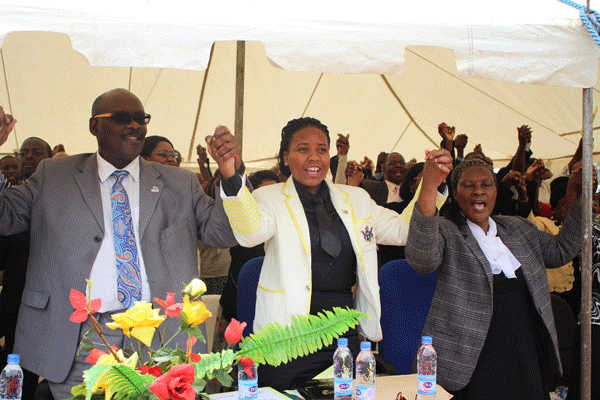
The National Aids Council (NAC) has given thumbs up to the Start Free, Stay Free, Aids Free framework, pledging to give maximum support to this global initiative.
By Tadiwa Nyatanga-Pfupa

The Start Free, Stay Free, Aids Free framework was launched at Dzivarasekwa Stadium in Harare on November 16 by Health and Child Care minister David Parirenyatwa.
Zimbabwe was the first country to launch the framework following its launch at global level at the 2016 High Level Meeting held in June in New York in the United States.
NAC board member Lotaris Shylette Ndiweni said the organisation pledges its commitment to the framework and added that the Start Free, Stay Free, Aids Free framework fits very well into NAC’s mandate which seeks to mitigate the impact of HIV. She highlighted that during the pre-High Level Meeting held in Cote D’Ivore in May, it was agreed that focus be concentrated on children and adolescents and young women as they are usually disadvantaged by negative social and economic factors.
“NAC already has in place a department that deals with gender issues and another that deals with youths. We will use these and other structures within NAC to implement activities that resonate with the Start Free, Stay Free, Aids Free framework,” she said.
As the coordinator of the response to HIV in the country, NAC is looking forward to an Aids-free Zimbabwe by 2030 in accordance with the United Nations Programme on Aids (UNAids) target. This can be possible if children who have an HIV-free start are supported so that they remain negative.
NAC is encouraging individuals, organisations and the nation at large to ensure that they keep young people protected from new HIV transmissions.
- Chamisa under fire over US$120K donation
- Mavhunga puts DeMbare into Chibuku quarterfinals
- Pension funds bet on Cabora Bassa oilfields
- Councils defy govt fire tender directive
Keep Reading
In a solidarity statement delivered by Unicef’s deputy country representative, Jane Muita, it is evident that infections among adolescents between the ages of 10 and 19 years are rising at an alarming rate.
“At the current pace of infection, we expect HIV prevalence in this age group to double within the next five years. Even more alarming is the high rate of infections among girls,” she said.
Muita called for a multi-sectoral, integrated approach to ensure that adolescents and young people remain free of HIV.
Parirenyatwa mentioned that great progress has been made in eliminating mother-to-child-transmission of HIV since the beginning of the prevention of mother-to-child-transmission (PMTCT) programme in Zimbabwe. He highlighted the possibility of “starting free” in Zimbabwe.
“To date, there are 1 560 sites providing services for PMTCT, 84% of pregnant women in need of PMTCT received ARVs while the mother-to-child-transmission of HIV has declined from a peak of 30% in 2009 to 7% in 2015,” he said.
Led by the joint UNAids and the US president’s Emergency Plan for Aids Relief (Pepfar), Start Free, Stay Free, Aids Free brings together a coalition of partners to build on the tremendous progress achieved under the Global Plan towards the elimination of new HIV infections among children by 2015 and keeping their mothers alive. Start Free, Stay Free, Aids Free provides a roadmap for the urgent work ahead, elevating and amplifying key initiatives that are already accelerating progress for children, adolescents and young women.
The launch was a prelude to a two-day symposium that is expected to come up with concrete objectives and implementation activities that will enable Zimbabwe to achieve these targets.
HIV testing and counselling services were availed on the sidelines of the launch and a number of people got tested for HIV. Young people also got information on sexual and reproductive health from Aids service organisations that exhibited during the launch.
NAC will use the four 90s and this Start Free, Stay Free, Aids Free framework as compasses, and will work with all stakeholders in the response to HIV so as to meet all set targets.
Tadiwa Nyatanga-Pfupa is the NAC communications officer.











